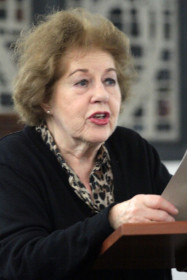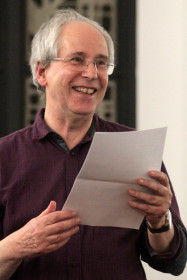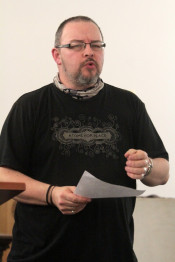Poetry that helps keep out the cold: celebrating 10 years of Camden Lumen

“Poetry makes nothing happen” is the famous phrase attributed to WH Auden. Even if Auden didn’t mean it in quite the way that it often has been taken, sometimes poetry does make things happen, it really does. For around the last 10 years Camden Lumen Poetry, a series of poetry events at two venues in London, has been raising money to help the homeless in the capital.
Poet and organiser Ruth O’Callaghan, pictured, will be marking the milestone with an event at the Royal Festival Hall featuring George Szirtes, Elaine Feinstein, and Fleur Adcock in 2018. As her website says, Ruth hosts “two poetry venues in London where both the famous and unknown read side by side. The revenue from these events funds approximately 65-70% of the money necessary to support three separate cold weather shelters for the homeless, thus making poetry a practical as well as a purely creative pursuit.”
As well as poets reading a poem each from the floor, the two venues – at the Trinity United Reformed Church in Camden, and at Lumen, in Tavistock Place, near King’s Cross – offer the chance for groups of poets to showcase their collective talents and voices.

Also reading in the first half were poets from Agenda magazine, who, owing to a misunderstanding, had arrived under the impression that they were the night’s showcase poets. They took their disappointment on the chin, with Jessica Mookherjee reading a poem that spoke of a “rasping magic” and which she said had been inspired by a friend who was homeless for a while, and had told her of waking up in a graveyard with a fox on his neck.
First of the readers from Canterbury was Trevor Breedon, whose poem ‘Merry-Go-Round’ is based on the 1916 painting of the same name by Mark Gertler. It talks of “mechanical canter to gallop, / Brave shouts and false squeals of fright, / Breath snatched in heavy gun recoil, / Eyes blind in electric blue flight,” and won the group’s open poetry prize in 2014.
‘Anthropocene’ envisages the future of our current era as a geological layer, and ends with these achingly sad lines, to us, anyway: “Let the microscope detect / with admiration / or with blame / the corruption / of so short / a time. “ Trevor is a former newspaper sub-editor, yet his ‘John Clare’s Awkward Squad’ begins: “I care not two spade spits for their gamekeeper grammar / It is nothing but a snare for words running free on the open page.” Well said, sir! Michael Gove, you sad, mad man, take note.
Jo Bridgwater’s ‘After the Thaw’ was inspired by a picture of a landscape in Ireland, and encompassed the smearing of “pristine white”, and a princess bride. Another poem included this memorable and strangely comforting line: “Nothing precious is ever entirely lost.”
Roger James's poem ‘Grenfell’, raged, as you might expect but quite rightly, against figures such as “buy-to-let oligarchs”, whereas ‘Cape Light’ had a softer tone, describing the light on Cape Cod, which ends at Nantucket, where Moby Dick was written. A poem about a recipe for gnocchi by the chair of SaveAs Writers, Luigi Marchini, mixed in references to Garibaldi, Mussolini and Verdi.

Mary Anne Smith’s poem ‘Out of the City’ is after a poem by Ted Hughes about Sylvia Plath, while ‘Channelling the Ocean, Rocking the Waves’ was both a satire on fashion and an attack on the pollution of the oceans, and ended with the words “mesh and unravel”. ‘Some Other Alchemy’ examined the money spent on a certain media mogul’s most recent wedding, including the “bloated 20-carat teardrop on his latest bride’s left hand”, and pointed out the greater good that such sums might do, spent in different ways.

He dedicated another poem, 'Are Not, Will Not', to a surrealist poet friend called Emil, and talked of growing up on a council estate in Hastings, and how the town was changing: “It’s beautiful now, gentrified. They’ve painted buildings in beautiful colours.” They don’t get that many performance poets at the Camden Lumen readings. But given the damned good cause that the readings are all about, a dose of social realism at the finale seemed just what the doctor ordered.
See more pictures from the reading




